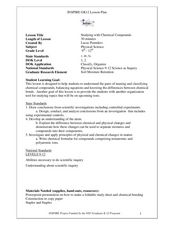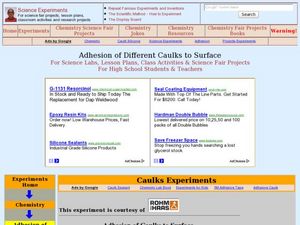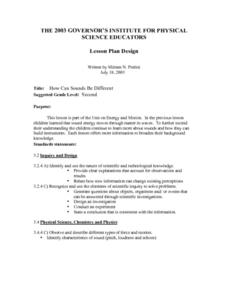Curated OER
Studying with Chemical Compounds
Students create a foldable to help them remember topics on chemical compounds. In this physical science lesson plan, students differentiate ionic and covalent compounds. Given certain compounds, they identify whether it's ionic or covalent.
Curated OER
How much Carbon Dioxide is in My Seltzer Water?
Students discover the law of conservation of mass though experimentation. In this chemistry lesson, students experiment with acid - base indicators to determine the presence of carbon dioxide. Students complete the labs with analysis...
Curated OER
Elements In Chemistry: Solids, Liquids and Gases
Students investigate the kinetic-molecular theory. In this state of matter lesson, students consider the differences of melting glaciers, melting icebergs and investigate on what happens when submerged water melts.
NOAA
History's Thermometers
How is sea coral like a thermometer? Part three of a six-part series from NOAA describes how oceanographers can use coral growth to estimate water temperature over time. Life science pupils manipulate data to determine the age of corals...
Curated OER
Where My Peeps At?
Students conduct a series of activity that demonstrates Charles' and Boyle's Law. In this chemistry lesson, students determine the relationship among pressure, volume and temperature. They solve problems using mathematical equation.
Curated OER
Chemical Bonding
Eighth graders identify the three main types of chemical bonds. In this chemistry instructional activity, 8th graders draw Lewis dot diagrams of elements and determine the bond formed. They create a model water molecule.
Curated OER
Don’t be a Stoic about Stoichiometry
Students review balancing chemical equations. In this chemistry lesson, students calculate moles of an unknown substance based on stoichiometric relationships in the balanced equation. They cite applications of stoichiometry in the real...
Curated OER
A Solution for Moles
Students calculate the concentration of different solutions. In this chemistry lesson, students explain what a solution is. They explain ways to change the concentration of a solution.
Curated OER
Will It Stretch?
Learners describe the effects of temperature change to rubber band's physical properties. In this chemistry instructional activity, students measure the length of rubber band when temperature changes. They explain why the length varies.
Curated OER
The Tell-Tale Plume
High schoolers examine hydrothermal vents. In this ocean instructional activity, students identify changes in physical and chemical properties of sea water caused by hydrothermal vents.
Curated OER
Adhesion of Caulks to Surface - Testing Product Quality
Students investigate quality products. In this Physical Science lesson plan, students will test three different types of caulking. The students are looking for the caulk with the best adhesion after two days of curing.
Curated OER
Set the Stage
Students observe evaporation in a controlled environment. Evaporation is the change of liquid water into water vapor (a gas). The rate of evaporation is determined by many factors such as air temperature and humidity, liquid temperature...
University of California
Hot! Hot! Hot!
Calories are not tiny creatures that sew your clothes tighter every night, but what are they? A science activity, presented at multiple levels, has learners experiment with heat, heat transfer, and graph the function over time. It also...
Teach Engineering
Concentrate This! Sugar or Salt...
Heat up your lessons on boiling points. The resource provides a three-part activity: first, groups find the boiling point of solutions; second, they create boiling point curves for salt and sugar solutions; and third, they mix a solution...
Kenan Fellows
Let's Move
Find a statistical reason for a fresh start. Using a hypothetical scenario, individuals research statistical data of three different cities. Their goal? Find the best statistical reason for a business to move to a new location. Their...
Physics Classroom
Charge Interactions
Has your class been repelled by your previous magnetism lesson plan? Try a fun interactive instead! The activity, part of the Static Electricity series, challenges scholars to infer the charges of a group of magnets based upon their...
Curated OER
How Can Sounds Be Different
Second graders explore energy and motion. They investigate how sound energy moves in waves. Students explore how sounds are varied and how the instruments that make those sounds are built. They observe sounds being produced and predict...
Curated OER
Methods of Heat Transfer
Eighth graders discuss the forms of heat transfer that relate to the human body. Discussion revolves around the ability of different designs of hats to change the rate of heat transfer to and from the body. Students then experiment...
Curated OER
Phases of Matter
Pupils comprehend the different phases of matter. They give examples of each phase and describe the processes of changing between these phases. Students are asked what is plasma? They are asked what is the four phases of matter? ...
Curated OER
A Comparison of Polymeric Liquids with Newtonian Liquids
Learners perform several tests on liquids. In this general science lesson, students compare the properties of polymeric and nonpolymeric liquids. They explain the composition and importance of macromolecules.
Curated OER
Beads, Balls, and Beakers
Young scholars analyze the amount of space required to pack round objects. In this geometry instructional activity, students practice using space economically by practicing packing spheres into beakers. They then translate this concept...
Curated OER
Teaching about the Chemistry of Oxygen Solubility
Students explore solubility of gases in water, Henry's Law, LeChatelier's Principal, and supersaturation of gases in water.
Curated OER
Physical Habitat of a Stream
Students measure in metric units and use a stopwatch, calculator. They collect data with minimal instructions after the initial pre-activity briefing, then record data in the data sheets provided.
Curated OER
Will it Stretch?
Students explore elasticity and describe the effects of temperature changes on physical properties. For this rubber band stretch lesson students complete an experimental activity and show their results.

























